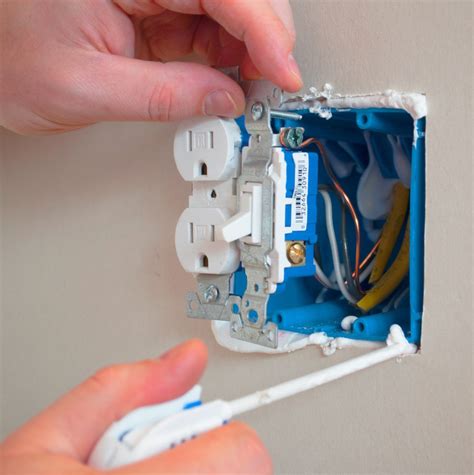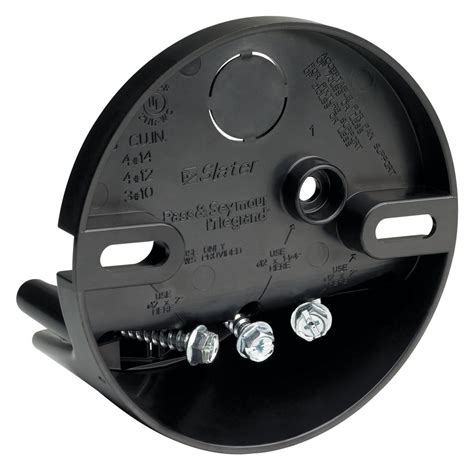fire chaulk in electrical boxes You want to use a fire-rated expanding foam or caulk. In the gaps within and around a ceiling box, I’d use the intumescent style of either which will expand further when exposed to heat. Be sure to clean out any foam or caulk . Building a wood fence on metal posts involves careful planning, attaching brackets, securing posts, and mounting wooden panels for a functional and visually appealing result. The cost of a wood fence with metal posts varies based on .
0 · sealing electrical boxes
1 · electrical box sealing instructions
2 · ceiling mounted electrical box
$179.99
Seal around installed wiring using caulk or canned spray foam. For ceiling-mounted electrical boxes, install the electrical box in the ceiling drywall, then caulk around the base and caulk all holes in the box with fire-retardant caulk. Which type of fire rated caulk did you use? There are two main types: intumescent, which expands when exposed to heat/fire. It’s usually only rated up to a few hundred degrees or so. Intumescent caulk is intended to .Air seal around all electrical wiring and electrical boxes installed through walls, ceilings, and flooring. Sealants (e.g., caulk, fire-retardant caulk, fire-rated spray foam, etc.) should be compatible with all adjoining surfaces and meet the fire . The GC is now telling is that some of the boxes in fire rated walls require putty pads. I have seen the code (NFPA maybe?) that describes that a box that is over 16 square inches (which applies, in some cases we used oversized boxes), a 100 square foot area, etc, etc and I have also seen literature from STI, Hilti and 3M on this.
You want to use a fire-rated expanding foam or caulk. In the gaps within and around a ceiling box, I’d use the intumescent style of either which will expand further when exposed to heat. Be sure to clean out any foam or caulk . Fire-rated putty pads; Caulking or fire-rated sealant (optional) Fire-resistant electrical box (if not already installed) Tools: Utility knife or scissors; Measuring tape; Safety goggles; Gloves; Cleaning cloth; Step 1: Prepare the Area Safety First. Before you begin, ensure that the power to the electrical box is turned off at the circuit breaker.
Metallic Electrical Outlet Boxes Listed single and double gang metallic outlet and switch boxes with metallic or nonmetallic cover plates may be used in bearing and nonbearing wood stud and steel stud walls with ratings not exceeding 2h. These walls shall have gypsum wallboard facings similar to those shown in Design Nos. U301,U411, and U425.6.Membrane penetrations of maximum 2-hour fire-resistance-rated walls and partitions by steel electrical boxes that exceed 16 square inches (0.0 103 m2) in area, or steel electrical boxes of any size having an aggregate area through the membrane exceeding 100 square inches (0.0645 m2) in any 100 square feet (9.29 m2) of wall area, provided that . What does the nec say about fire caulking holes in the top plate to attic area in a single story dwelling? I knew you had to between floors but I for some reason thought you didnt have to on a 1 story house. Next question 1/2" carlon flex thru a 1" hole in brick ( couldnt be more than a 1/16" gap around flex ). Ahj wants it caulked also.A listed electrical box for use in fire-resistive assemblies is being installed in a two-hour rated wall. Assuming there are no other electrical boxes on the opposite side of the wall, this installation does not require any penetration protection as long as the annular space between the electrical box and the wall membrane does not exceed ? . a .
Recessed Boxes in Fire-rated Walls Using Firestop Putty Pads, Box Inserts, Cover Plate Gaskets and Endothermic Mats By John Valiulis, IFC Technical Director . preserve the wall’s fire resistance. All steel electrical boxes larger than 16 sq. in. must be protected in some manner, regardless of the spacing to other boxes on the opposite sides . Membrane penetrations by boxes other than electrical boxes, provided such penetrating items and the annular space between the wall membrane and the box, are protected by an approved membrane penetration firestop system installed as tested in accordance with ASTM E 814 or UL 1479, with a minimum positive pressure differential of 0.01 inch (2.49 . Caulking around the out let boxes Caulking around the out let boxes . It's falling back on the EC because the rejection notice says electrical box. . 1/8" rule was pretty tight on commercial jobs I did for LV/LE (communications), with . Plug the holes with fire caulk (IMHO rockwool serves no useful purpose in your proposed scheme.) If you really want to do a better job, particularly with respect to rodents, ditch the NM and use MC or AC cable instead, or run EMT conduit. But for sealing the penetrations, that's what fire caulk is made to do.
Air sealing the holes inside an electrical box: silicone caulk, every time. Air sealing the gap around an electrical box: silicone caulk for gaps below 1/4″, or in high temps. Otherwise, spray foam. Here’s why silicone is the clear choice for the insides of existing, wired boxes. The sizes of electrical boxes are dictated by code.
sealing electrical boxes

electrical box sealing instructions
OK, so we’re going to seal up all of the knockouts, and we’re going to seal the drywall to the rim of the electric box. And in this case, because this has the potential to get warm, and even hot, because of the electrical fixture below, I’m going to use some fire-blocking sealant. Put another way, the NEC simply states that the electrical penetration must be sealed with an approved firestopping method to MAINTAIN the fire resistance rating of the structure (wall, partition, floor, etc.).Nothing in the NEC determines WHETHER a structure is or is not considered a fire resistant rated structure or what that rating is (or is not).

The electrical comes in through buried cables not through overhead wires (which I assume drip loops are associated with > via Googling) I was thinking of caulking where the wires come through the floor/wall and at .
Available in a convenient 10.3-ounce tube, it meets ASTM-E136 standards, ensuring top-quality fire prevention right where you need it most. Ideal for use around electrical boxes, pipes, and vents, the F4P FIRE BLOCK is a crucial .Since the typical installation of an electrical box only impacts one side of the partition, special firestop details may not be needed. In many cases the individual boxes are covered with what might appear to be “fire caulk” or a putty-type .A listed electrical box for use in fire-resistive assemblies is being installed in a two-hour rated wall. Assuming there are no other electrical boxes on the opposite side of the wall, this installation does not require any penetration protection as long as the annular space between the electrical box and the wall membrane does not exceed _____
Along with this, the Box is wrapped with a "Fire Pad", and the point of penetration for the wiring system to the wall, is sealed with "Fire Caulk" Back in the 1980's (for me, starting at 1982 and proceeding to 1989), the only thing we would use in rated walls was EMT (as opposed to Aluminum Flex).Option 2: Caulk. To get caulk in, tape a tube (like the one from a pen) to the caulk nozzle. Option 3: duct seal putty. Seal the box's perimeter. If there's plaster around it, it might not be attached well. If so, remove it. Make a big enough gap around the box for caulk. Then, caulk. With access behind the wall: Use putty pads. FIRESTOP SEALANT - These electrical box putty pads are designed to seal electric boxes to maintain the hourly rating of fire-rated walls containing electrical outlet boxes with high efficiency in mind . ABOAT T Fire Putty Electrical Putty Pads Fire Barrier Moldable Putty with Disposable Gloves for Sockets Wall Openings Electrical Box Water .
Yes in Chicago which is all emt,we still have to fire caulk all Penetration's top and bottom plates. Fire caulk any wall returns with a pipe thru it. No back to back boxes on attached garage walls. Sent from my E6782 using Tapatalk Membrane penetrations of maximum 2-hour fire-resistance-rated walls and partitions by steel electrical boxes that do not exceed 16 square inches (0.0103 m2) in area, provided the aggregate area of the openings through the membrane does not exceed 100 square inches (0.0645 m2) in any 100 square feet (9.29 m2) of wall area. The annular space . I'd like to minimize sound leakage through these potential holes. At the minimum, I'll be sealing the gaps between the drywall and the electrical boxes with acoustic caulking, but I'm not sure about this idea of smearing the outside of the boxes themselves with caulking. My main worry would be the electrical code or fire hazards.
42 votes, 48 comments. 123K subscribers in the electrical community. Polywater FST and A. cant remember the letters for the second one. FST is a aresol can the other is a 2 part caulk tube type, both foam.Information regarding the use of outlet boxes in fire-rated floor/ceiling and roof/ceiling assemblies can be found on page 4 in Volume 1 of the 2000 edition of the UL Fire Resistance Directory. . and in wall and partition assemblies in accordance with the National Electrical Code (NEC). These boxes provide the required fire resistance when . I cut out for the electrical box and I got pretty close but there is still a considerable half inch gap most of the way around, and wider at the corners. . Here's a picture of the box: I bought two 3M fire caulks, FB-136 (gray) and CP-25WB+ (red). CP-25WB+ is "intumescent" meaning it expands if there's heat. FB-136 is "versatile" which I .

ceiling mounted electrical box
what is solar panel junction box
Chrome and brushed nickel cabinet hardware are the most popular choices for traditional kitchens because the colors are understated and match stainless steel appliances, which are common to this kitchen style.
fire chaulk in electrical boxes|ceiling mounted electrical box